Guide on How To Create Terms And Conditions For An Online Store
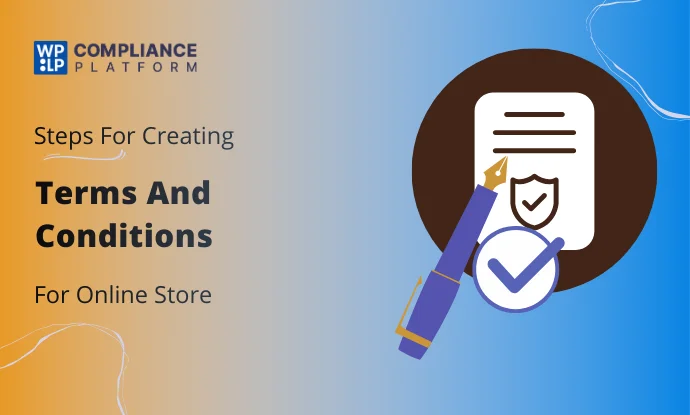
Summary
Our article covers key components like payment terms, intellectual property rights, and return policies. It also explains liability limits and dispute resolution.
WP Legal Pages offers simple templates to streamline the process.
Are you thinking of creating terms and conditions for your online store?
Terms and Conditions is a legally binding agreement that lets you protect the business and limit the liabilities of your online business. All the websites have this document on their website for users if they wish to browse your online store or to buy something.
It is created to cover a variety of essential clauses or sections based on the business’s nature.
In this article, we will highlight how to create terms and conditions for an online store and its importance.
- What Do Terms and Conditions Signify to the End User?
- Do I Need Terms and Conditions For An Online Store?
- Reason For Having Terms and Conditions for An Online Store
- What to Include in Terms and Conditions For Online Stores?
- Where Should You Place Your Terms and Conditions on The Website?
- Examples of Terms and Conditions Policy
- Introduction to WP Legal Pages Plugin
- FAQ
- Wrapping Up
What Do Terms and Conditions Signify to the End User?
Although terms and conditions might not be needed by the law, it is still a smart decision to put terms and conditions for an online store. The page can restrict your liability in case a customer drags you to court. In such a scenario, having the content of terms and conditions for an online store will protect your rights.
Keeping in mind that the court will look into your website to comprehend the contractual terms between you and your customer,. To save yourself, you must take these terms and conditions seriously.
The terms and conditions agreement can be considered a legally binding contract that comprises all of the disclosures that you would need to prevent any misuse or abuse happening to your brand.
Such an agreement comprises guidelines for acceptable behavior, rules against abusive users, and other essential sections. In simple words, this agreement tells the users that they will not be liable for anything going bad when using the website, product, or content. Typically, such kind of an agreement includes:
- User responsibilities and rights
- Notifications are sent to users upon modifications and alterations in the agreement.
- Expected and precise use of the site and possible misuse
- Limitation of liability and disclaimer that clarify the legal liability of the website for damages incurred by the user
- Responsibility for online conduct, behavior, and actions
- An opt-out policy that describes the procedure for the termination of the account
- The outline of the privacy policy for the use of personal data
- Payment details, such as subscription fees or membership fees
Do I Need Terms and Conditions For An Online Store?
Setting Terms and Conditions can benefit all, including bloggers, eCommerce stores, and enterprises. Terms and conditions directly relate to existing law and are essential for preventing misuse in general.
Terms and conditions are essential for protecting you from legal liabilities. However, they also often contain legally required information, such as user rights and cancellation or withdrawal policies (particularly for eCommerce companies).
Honest Terms and Conditions are necessary when complicated matters are involved, such as in the case of eCommerce, where sensitive data, like payment information, is processed.
In these situations, the Terms and Conditions usually include legal information about the terms of sale and disclosures about payment options, shipping, delivery, cancellation policies, and withdrawal policies, among other things, as required by consumer protection laws.
Hence, we recommend that you have a terms and conditions policy for your online store.
Reason For Having Terms and Conditions for An Online Store
- Prevent Abuse:- The agreement can include required sections to communicate the guidelines to the users. Moreover, it also states the consequences users can face in case of any misuse or abuse, such as attempting to hack or infect the site and more.
- Let You Own Your Content:- You have the right to the content, logo, website design, and other material. In the agreement, you can inform the users about the ownership and that your content is protected by international copyright laws.
- Allows You to Terminate Accounts:- Apart from allowing you the right to ban a user temporarily, it will give you the right to terminate an account completely. With this clause, you can communicate to your users that abusive accounts will not be entertained and will be completely banned from using the site.
- Limits Your Liability:- It includes a warranty disclaimer that attempts to restrict the liability of the website owner in case an error is found in the content available on the website.
These terms and conditions are governed by the regulatory authorities.
What to Include in Terms and Conditions For Online Stores?
When creating a terms and conditions agreement for the online store, keep in mind the below list of clauses:
Limitations & Liabilities
One of the most important reasons to have a T&C is to limit the liabilities and prevent customer litigation. With this clause, you can let the customers know that you and your business will not be responsible in case any liability issues come up. These could be personal injury, delivery or service problems, death, defective items or products, fraudulent misrepresentation, and more.
Payment Terms
Generally, the prices of products are always subject to change. And, you should establish your right to change these prices in a dedicated Payments or Pricing clause. Other details of the customer transactions, such as discounts, refunds, returns, shipping, etc., should also be addressed in the clause to provide legal rights to handle the matters of the online store.
Intellectual Property
As the owner of the online store, you are likely to have unique designs, items, content, and other proprietary rights that you would like to safeguard. This can be done with a precisely crafted clause that is dedicated only to Intellectual Property Rights. The terms and conditions agreement offers you a platform where you can declare everything that comes under intellectual property, the rules for using that information or items, and the consequences of violating intellectual property rights.
Dispute Resolution
This is another important clause that should be available in your agreement. It defines the process to follow in case of a dispute. Typically, the clause establishes the jurisdiction where the dispute will be taken and the governing law that will be applied. Also, this clause is specifically important for those stores that serve a global audience.
Returns & Exchanges
Another clause to be added in the T&C document is about Returns and exchanges. Since you are running an eCommerce store, the queries related to the return or exchange of an item are bound to happen. Thus, with this clause, you can outline whether your store allows this service or not. And, if you do allow, then define the entire procedure for the same.
Cancellation
Lastly, a Cancellation clause is another vital part of the agreement. With this section, you can outline the process of canceling the order. Along with that, you can also add extra information, such as the time period for cancellation, situations when cancellation is acceptable and unacceptable, etc.
Where Should You Place Your Terms and Conditions on The Website?
Having a well-written Terms and Conditions document won’t help your business if no one reads it, so it’s ideal to link it to the footer of your website so that it is easily accessible to the customer.
Signup and checkout forms are useful places to provide links to the Terms & Conditions page, in addition to the website footer. The terms and conditions document should have a link to the privacy policy as well to let customers know about the privacy rules.
Examples of Terms and Conditions Policy
Let’s have a glance through some terms and conditions policy examples to get a better idea of the development:
American Eagle Outfitters– Retail Website Terms and Conditions Template
It is quite common for clothing brands to include a specific section on products and purchases. For instance, the terms of use by American Eagle Outfitters comprise a Product and Pricing Information section that talks about the process of purchasing, potential pricing, online payment methods, and more.
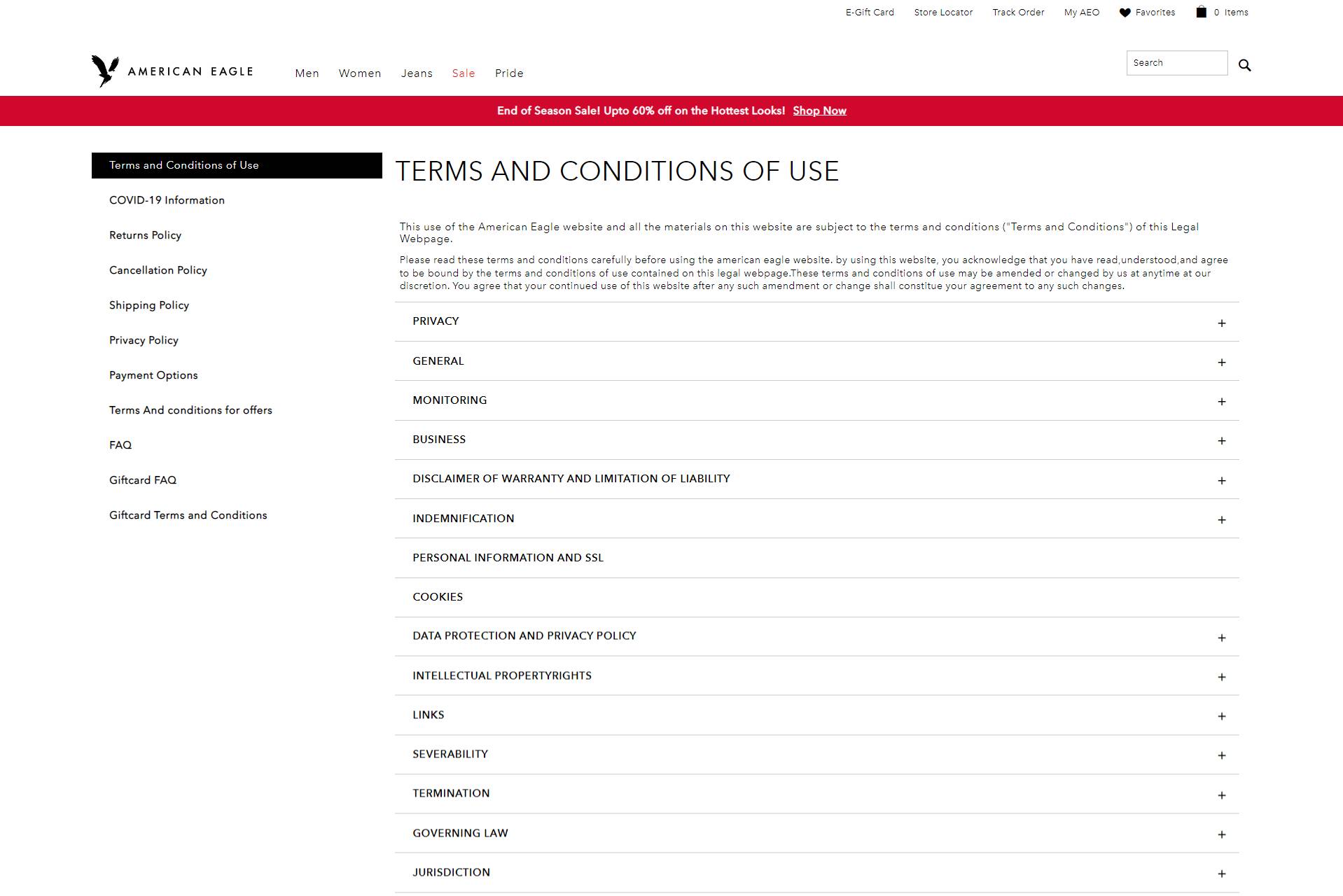
Walmart
If your online store lets users give feedback, you must include a user submission clause to define the consequences and rules of submitting the content. The terms of use by Walmart talk about users who submit the content having to let the business take charge of editing, displaying, and distributing the content.
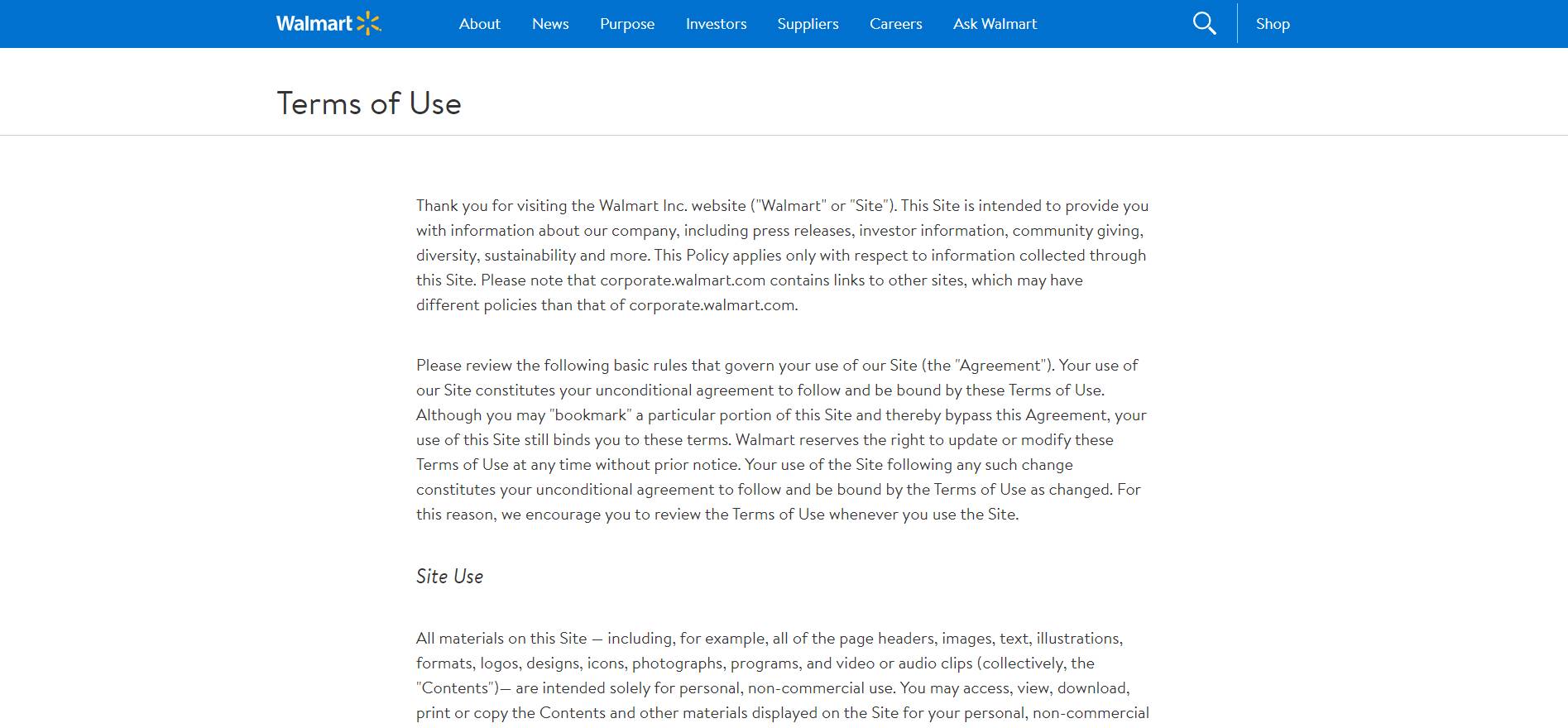
Now that we have understood what is the importance of terms and conditions for an online store. You all might be thinking about how to create one for your website. A plugin called WP Legal Pages can be used to create privacy policy documents on the website.
Introduction to WP Legal Pages Plugin
If you are looking forward to creating a terms and conditions document for your online store, WP Legal Pages is the perfect free tool that you can use. Trusted by more than 20,000 websites operating across the world, this plugin allows you to use ready to use templates and edit them according to your brand’s information.
Although loaded with an array of features, one of the best parts about this plugin is that it supports a wide range of websites, including WooCommerce stores and other online stores.
We recommend that you create any legal page for your website using the WP Legal Pages plugin. This helps to create legal pages such as privacy policies, legal disclaimers, cookie policies, copyright text, and many more.
The user-friendly interface of WP Legal Pages is one of its most important features. To use the plugin, you do not need to be a technical expert. Additionally, it provides customization tools so you can adapt your copyright text to meet your unique needs.
Advantages of WPLegalPages
Here are a few advantages that only a plugin can offer and can limit the errors and mistakes made by humans.
- Available for Free:- To begin with, you are getting a nearly perfect plugin without paying any high-end fee. By downloading the plugin for free, you can get access to an extensive range of useful features and pre-made templates.
- Avoiding Human Error:- When you write a terms and conditions agreement on your own, errors and issues ought to happen. Hence, the WP Legal pages plugin helps to make documents with fewer mistakes and errors.
- Other Policy Documents:- Apart from the terms and conditions agreement, you can also find plenty of other basic policy documents, including privacy policy, Facebook policy, cookie policy, Amazon affiliate disclosure, affiliate agreement policy, and more.
- Trusted Users:- The fact that the free version of this plugin has more than 20,000 active installations.
Installing and Using WP Legal Pages
Setting up the WP Legal Pages plugin is very simple, and you can create terms and conditions for an online store in just a few minutes.
From the WordPress Dashboard, select Plugins > Add New.

In the Search Bar, type WPLegalPages.

Click on the Install Now button.
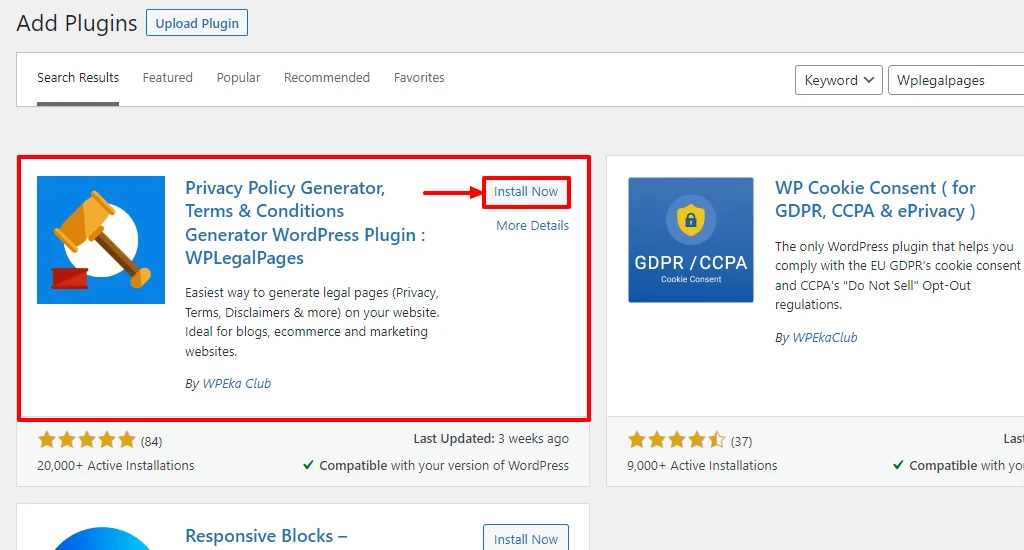
Next, click on the Activate button.
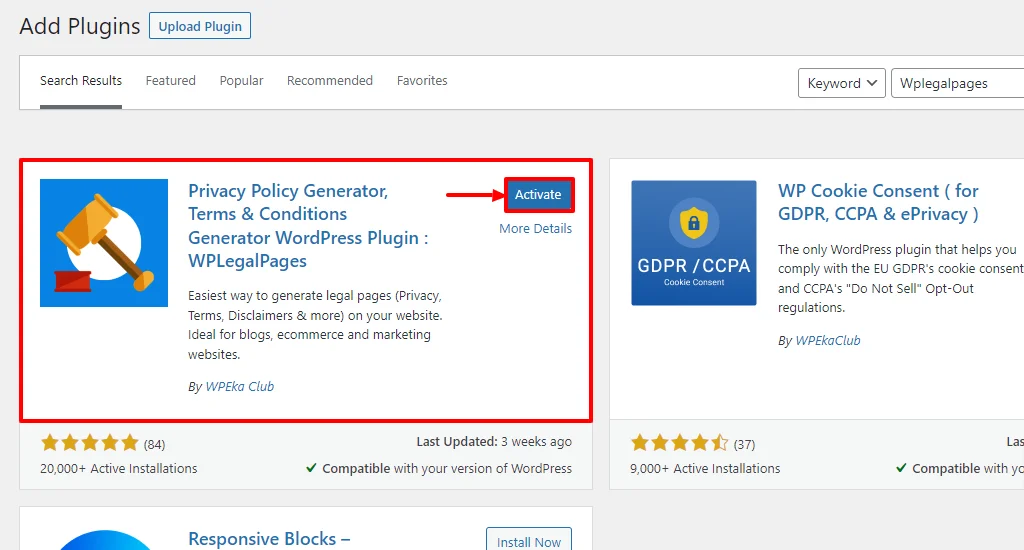
Next, accept the terms of use of the WPLegalPages plugin.
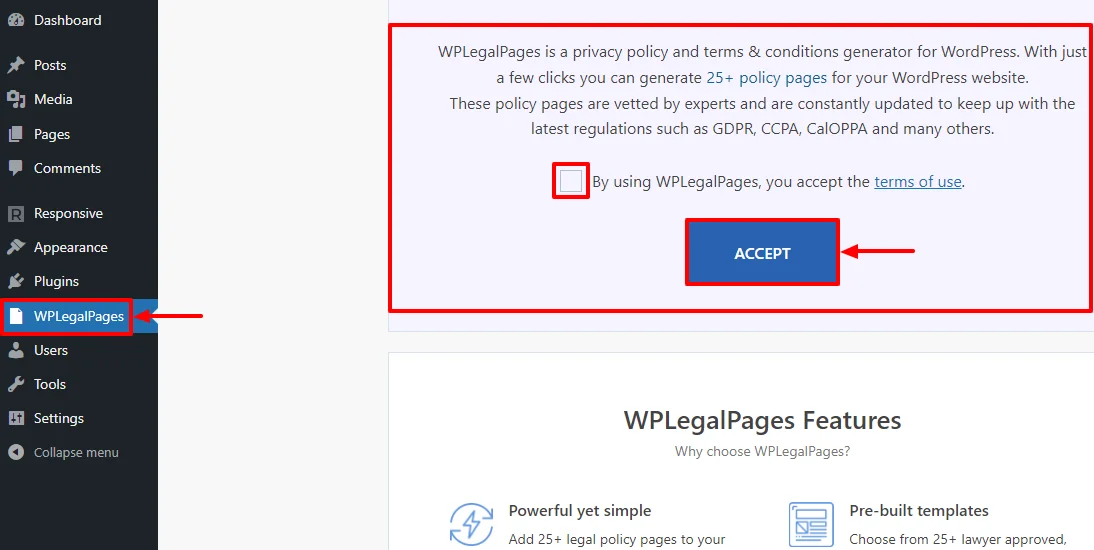
That is all. WPLegalPages plugin installation is complete. Next, in order to access the terms and conditions template, you must have the premium edition of the plugin.
Visit the product website and buy the plugin in order to install the premium version of WPLegalPages. You can access more than 25+ legal page templates, including the terms and conditions template, by purchasing the premium plugin.
Following your purchase, an email including the product zip file, API key, and Product ID will be sent to you.
Now, go back to WordPress and click on Add New Plugins. Next, click on the Upload Plugin button at the top and upload the zip file you’ve received. Once uploaded, click the Install Now button.
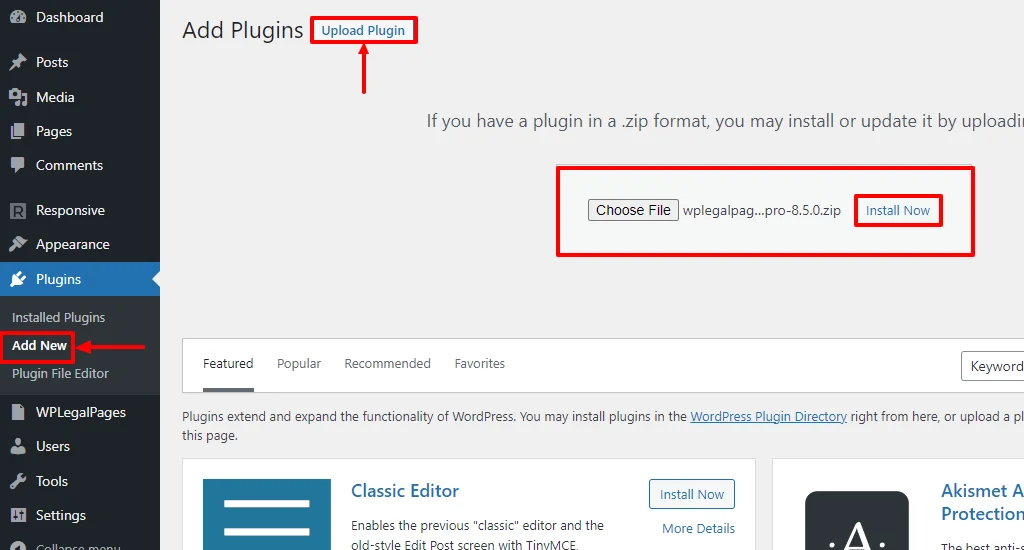
Click the Activate button.
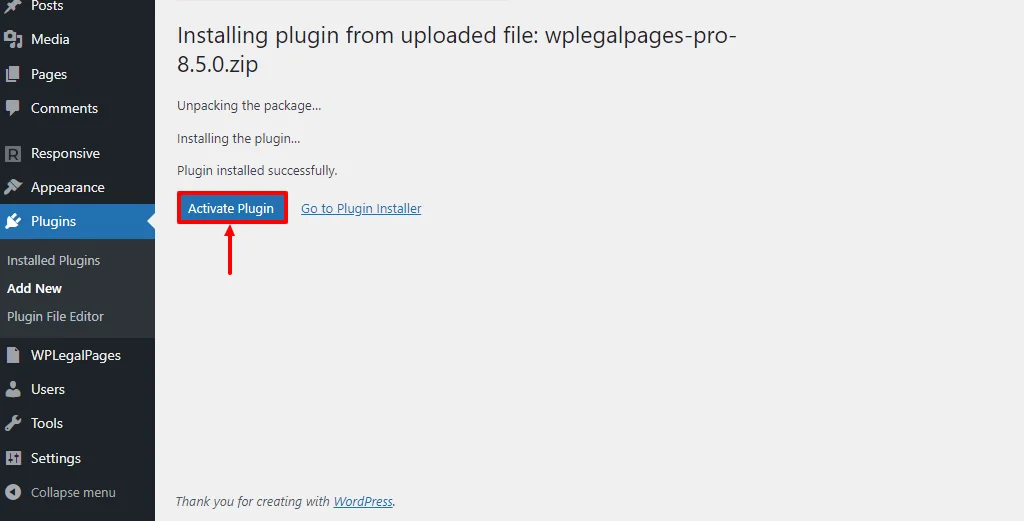
After activating the pro plugin, select the Activate your License Key option. This will lead to a page where you must fill in the API key and Product ID.
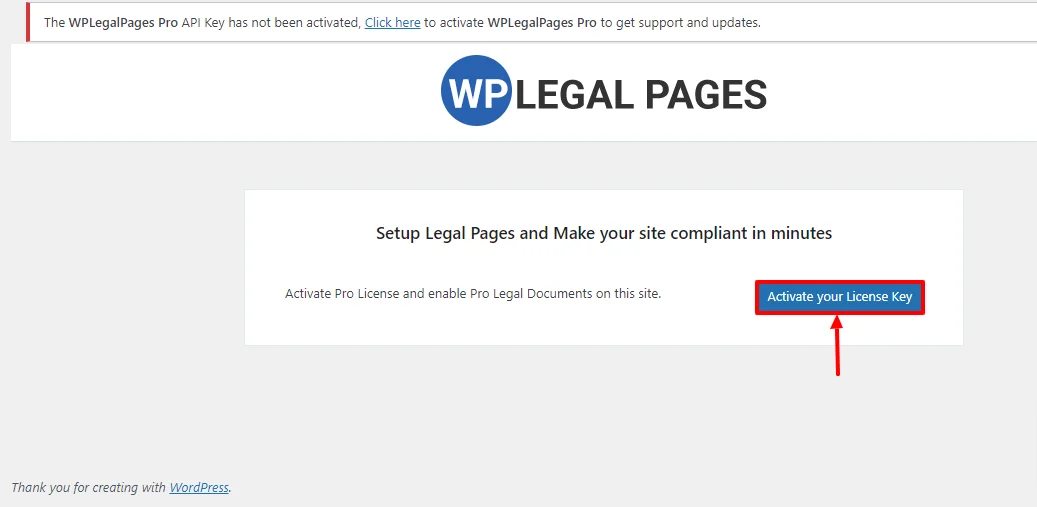
Fill in the API key and Product ID you received in your email and click on the Save Changes button.
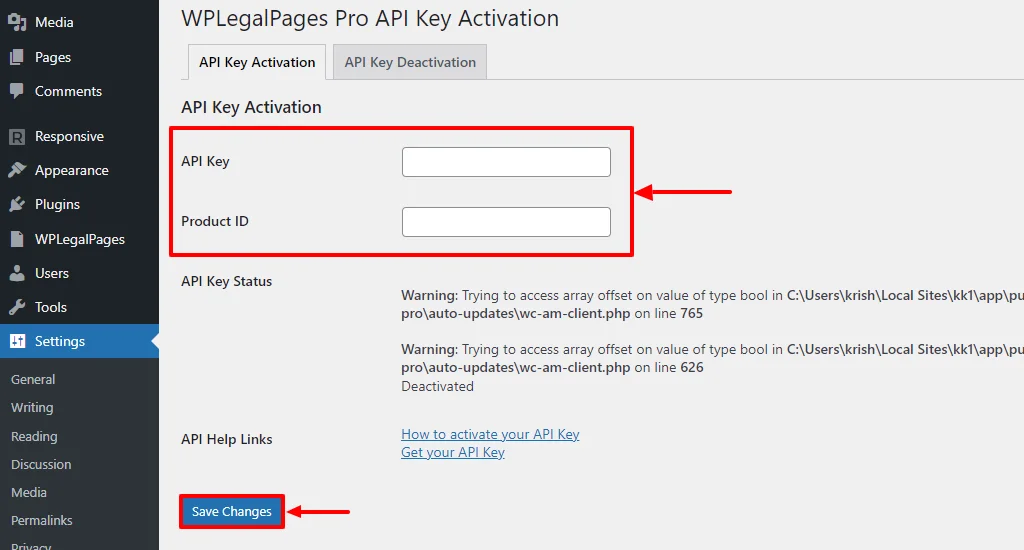
You’ve now completed the installation of the WPLegalPages Pro plugin.
Create a Terms and Conditions Page using WP Legal Pages Plugin
Follow these steps to create a terms and conditions page using the WPLegalPages plugin.
Head to the WordPress dashboard, navigate to WPLegalPages, and click the Create Legal Page menu.
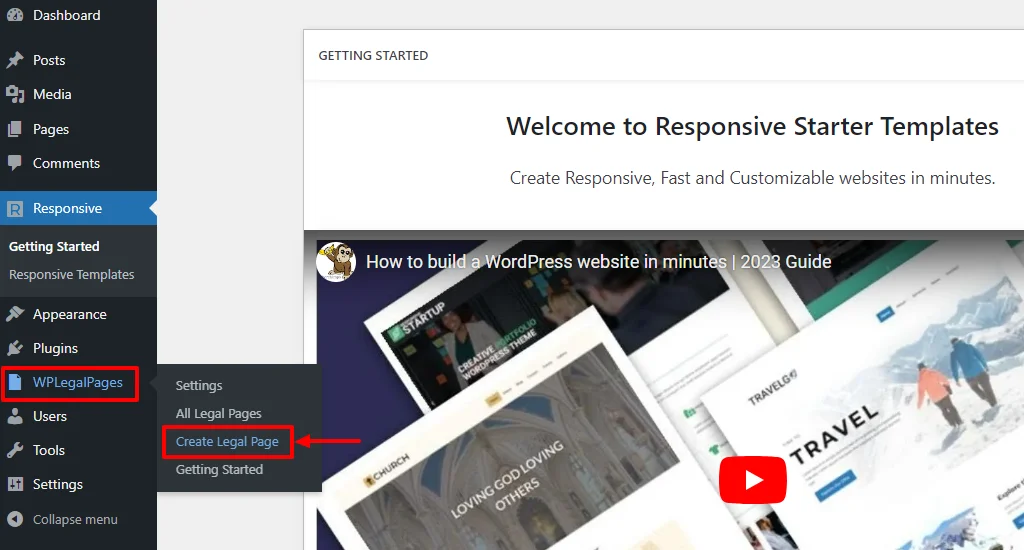
This will open the WPLegalPages wizard. From the WPLegalPages wizard, choose the terms and conditions template and click on the Create button.
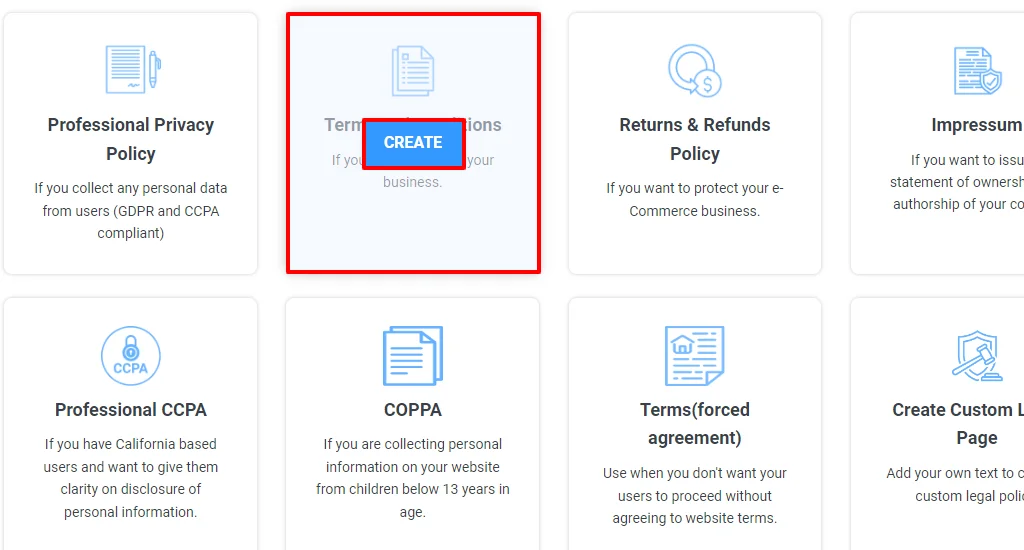
Next, fill in the Recommended Settings page fields and click the NEXT button.
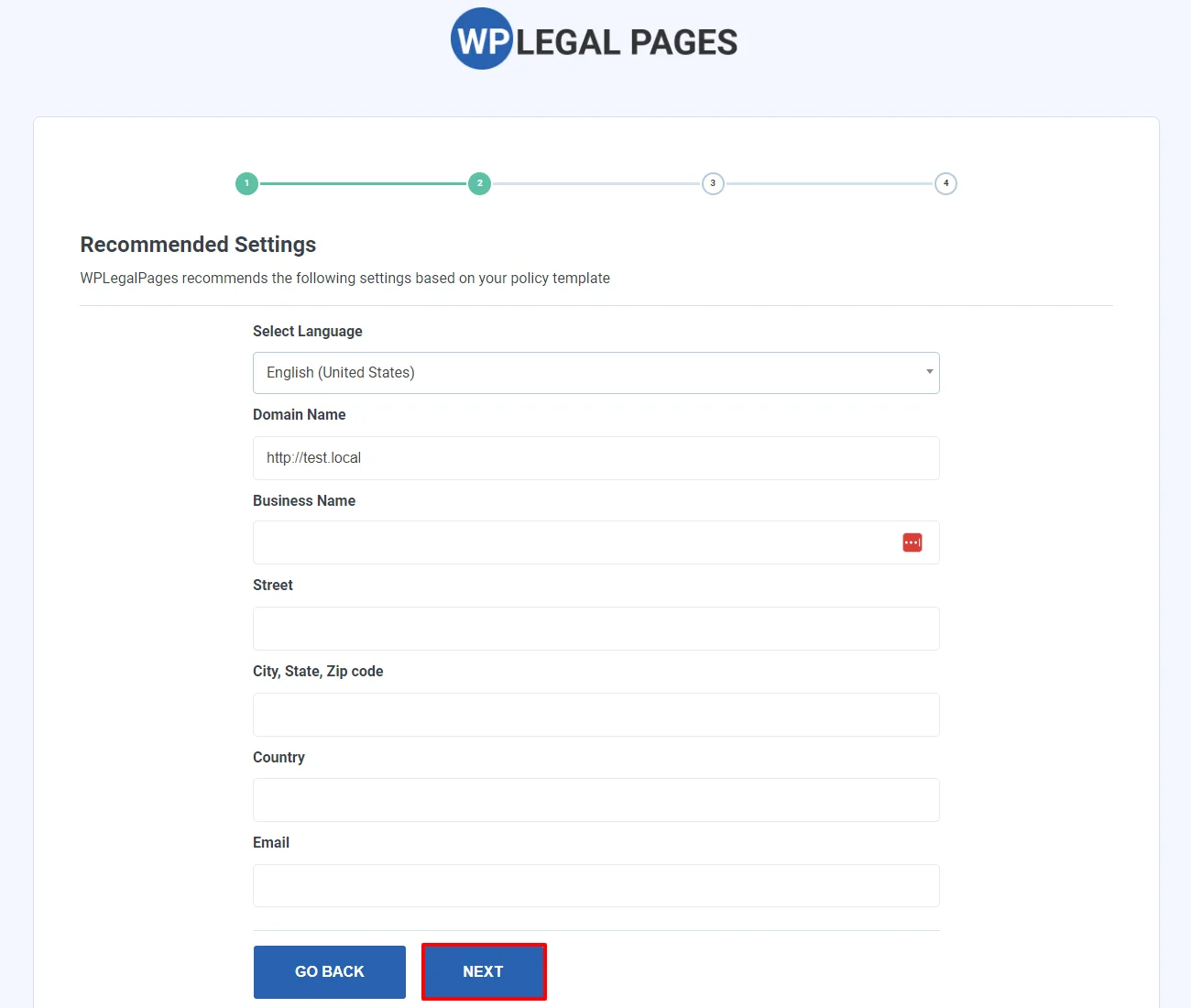
Now, choose the appropriate sections for your page and fill in the details. Once done, click the Next button.
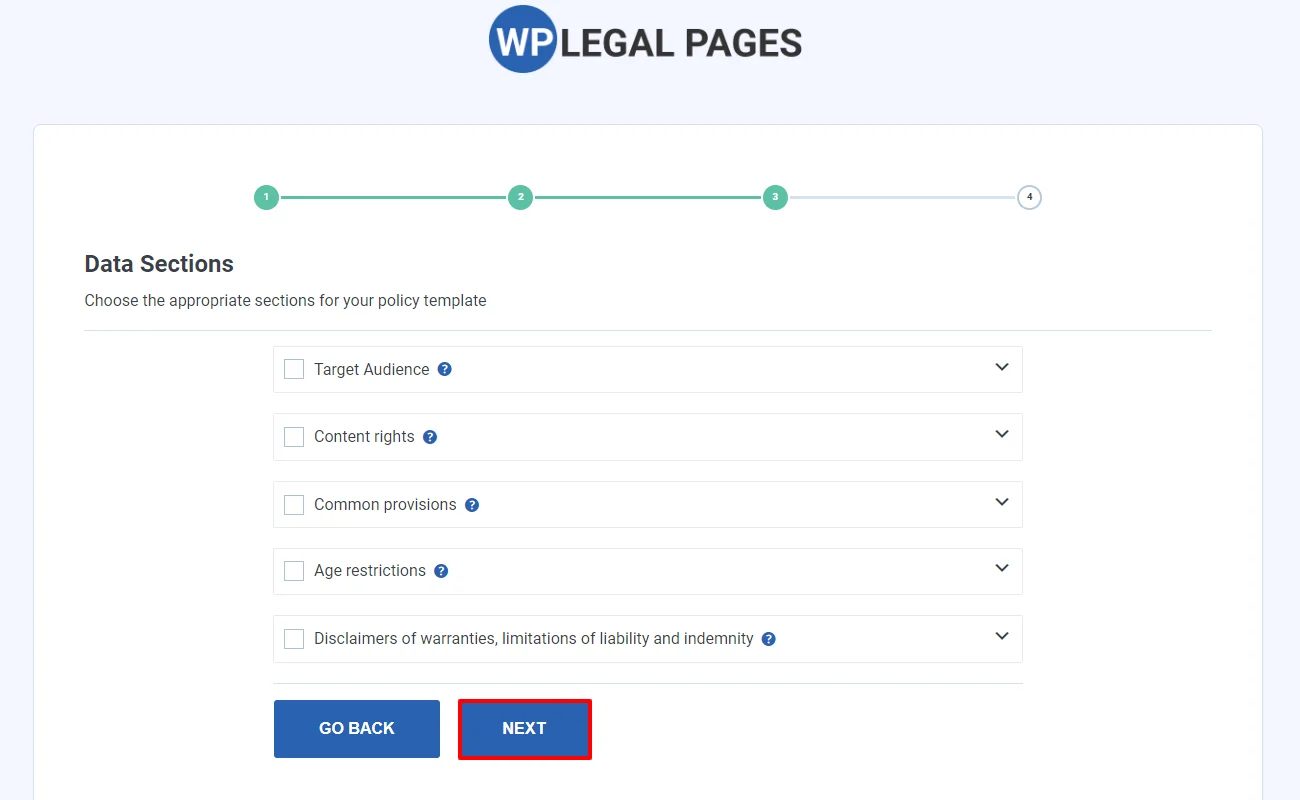
You can now check the preview of the terms and conditions page. Once reviewed, click on the Create and Edit button.
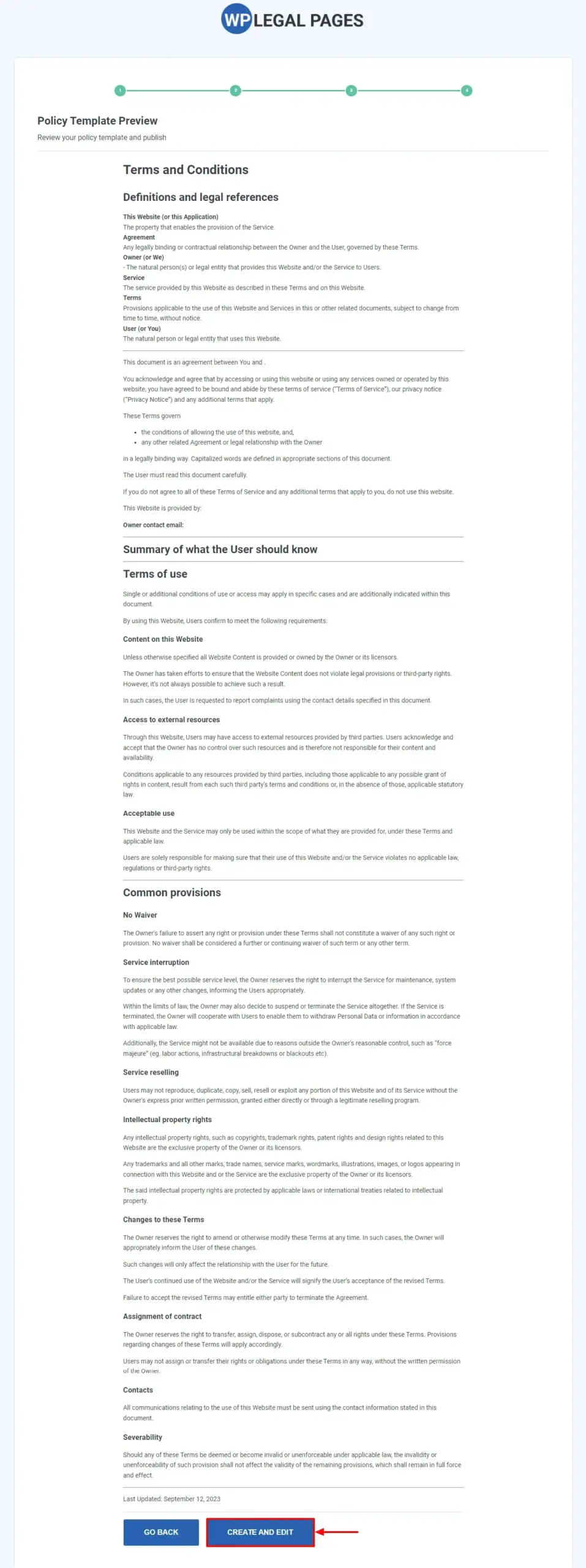
This will open the WordPress editor. Review all the details in the editor again and click the Publish button.
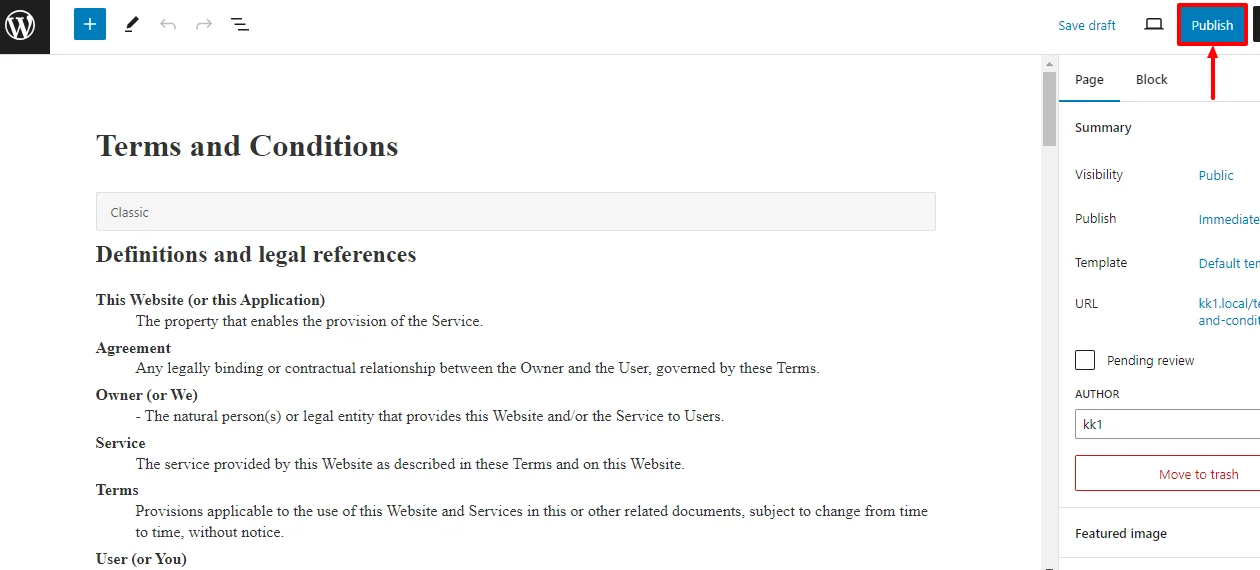
That’s it! You now have successfully created a terms and conditions page for your website.
FAQ
You can use a WP Legal Pages plugin to create Terms and Conditions for your business.
Place a link to the terms and conditions in the footer or header of the website for easy access.
Wrapping Up
Now that we have understood the importance of terms and conditions, having this document on the website is not mandatory by any laws. However, you should have it on your website to reduce the liability if things don’t go as per the plan.
Having terms and conditions for an online store is essential because they could influence how users engage with your website. It is essential to have a well-written Terms and Conditions agreement because it lowers liability and safeguards your intellectual property.
We recommend using WP Legal Pages plugin, a privacy policy generator. It will help to create terms and conditions for an online store with minimal effort and a ready-to-use template.
If you liked reading this article, don’t forget to read our other engaging articles:
- Understanding Privacy Statements and Simplifying Compliance
- Uncover Cookie Analytics: What Are Analytical Cookies?
- How To Add Copyright Text To A Website
Are you excited to create terms and conditions for online and gain the trust of your visitors? Grab WP Legal Pages now!
